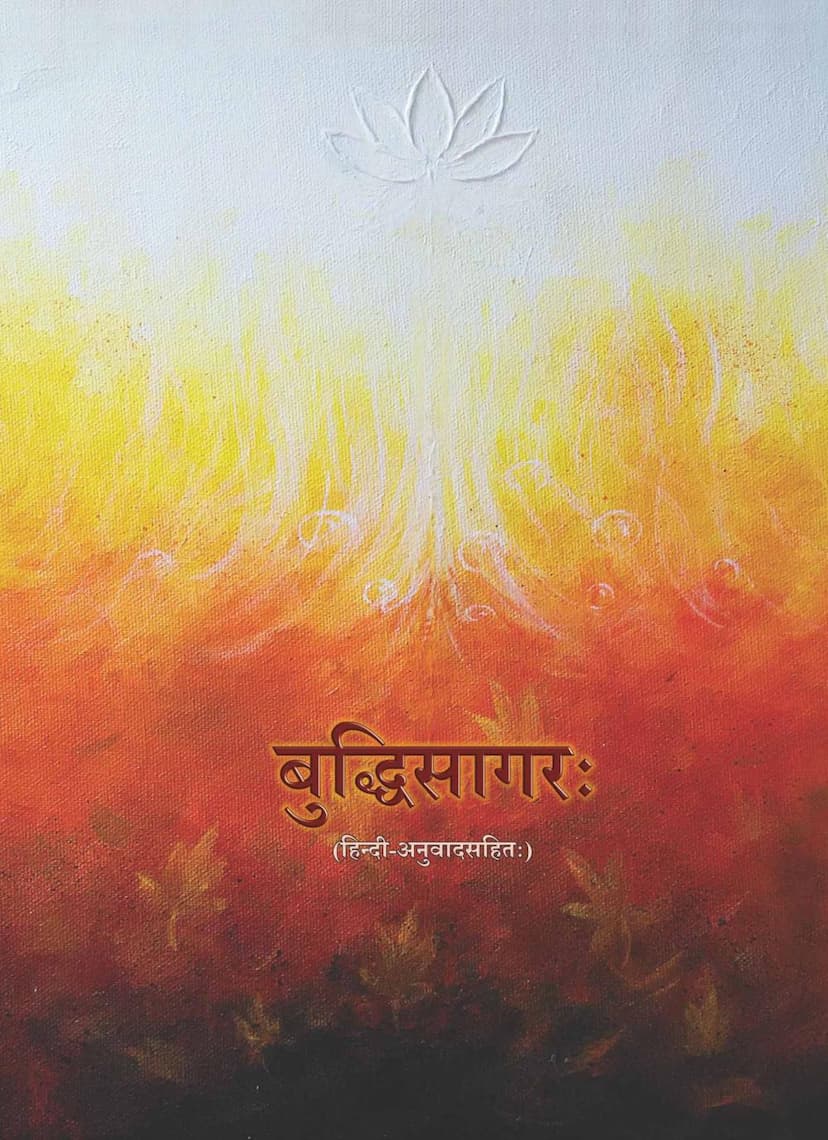Buddhisagar
Added to library: September 1, 2025

Summary
Here's a comprehensive summary of the Jain text "Buddhisagar" by Sangramsinh Soni, based on the provided pages:
Book Title: Buddhisagar Author: Sangramsinh Soni Publisher: Shrutbhuvan Sansodhan Kendra, Pune Theme: Upadesha (Preaching/Advice), Niti (Policy/Ethics)
Overall Purpose: The book "Buddhisagar" (Ocean of Wisdom) is a collection of teachings and ethical guidelines intended for the general populace. It aims to provide practical wisdom and moral guidance for leading a virtuous life. The text is presented in Sanskrit with a Hindi translation, making it accessible to a wider audience.
Author and Context: Sangramsinh Soni, the author, is identified as a householder (Grahasta) and a descendant of the Soni (goldsmith) community. He was a person involved in politics and lived during a significant period in medieval Indian history. His lineage traces back to Sangana Soni, a prominent Oshawal follower who migrated from Khambhat to Mandavgad in Malwa around the late 13th century. Sangramsinh Soni was a poet and a devout follower of Jainism, particularly influenced by Acharya Som Sundar Suri. The text itself mentions his participation in a war in the south against Nizamshah, during which the "Buddhisagar" was composed in Sanskrit. This context highlights the author's unique position as a learned layman contributing to Jain literature, particularly in the realm of practical ethics and statecraft.
Structure of the Text: "Buddhisagar" is structured into four chapters, referred to as "Tarangas" (waves):
-
Dharma Taranga (धर्मतरंग): This chapter focuses on general ethical principles and duties. It covers topics such as the importance of dharma, truthfulness, non-stealing, non-possession, ethical conduct in relationships, respect for elders and teachers, and the duties of householders, celibates (Brahmachari), and ascetics (Yati). It emphasizes virtues like compassion, forgiveness, and self-control.
-
Naya Taranga (नयतरंग): This section delves into politics, governance, and the qualities of rulers and their subjects. It discusses the role of the king, queen, prince, ministers, officials, and the general populace. It outlines desirable attributes for a king, such as righteousness, justice, strategic thinking, and the welfare of his subjects. It also touches upon the importance of good counsel and the characteristics of efficient administrators.
-
Vyavahar Taranga (व्यवहारतरंग): This chapter provides guidance on practical conduct in everyday life, business, and social interactions. It covers aspects like honesty in dealings, the importance of wealth (earned ethically), the proper conduct of married life, the significance of reputation, and advice on choosing associates and avoiding misconduct. It also touches upon the principles of building and maintaining homes.
-
Prakirnak Taranga (प्रकीर्णकतरंग): This chapter encompasses a wide range of miscellaneous topics, including aspects of health and medicine (Vaidyakasar), astrology and auspicious timings (Jyotissar), omens (Shakun), palmistry (Samudrik), characteristics of women (Stree Swaroop), gemology (Ratna Pariksha), detachment (Vairagya), and the yogic path (Chaturvidha Yoga).
Key Themes and Teachings:
- Ethics and Morality: The book strongly emphasizes righteous conduct, truthfulness, compassion (Daya), non-violence (Ahimsa), and the importance of adhering to one's dharma.
- Good Governance: For rulers, it stresses the need for justice, wisdom, strategic planning, and ensuring the welfare and protection of subjects. A king's duty is paramount for the prosperity and stability of the kingdom.
- Practical Wisdom: "Buddhisagar" offers practical advice for daily life, covering aspects from personal conduct and business ethics to social interactions and health.
- Detachment and Spirituality: The later part of the text, particularly in the Prakirnak Taranga, touches upon the concept of detachment from worldly pleasures and the pursuit of spiritual liberation through Yoga.
- The Importance of Knowledge and Wisdom: As the title suggests, the book is an "Ocean of Wisdom," advocating for the cultivation of knowledge and intelligence for personal and societal well-being.
- Historical Context: The text provides glimpses into the socio-political landscape of medieval India, mentioning rulers and societal norms of that era, particularly in Malwa and surrounding regions.
- Veneration of Jain Principles: The author's deep devotion to Jainism is evident throughout the text, with references to Jain Tirthankaras, Acharyas, and core Jain ethical doctrines.
Significance of the Edition: This publication by Shrutbhuvan Sansodhan Kendra is a critical edition that aims to provide a well-researched and refined version of the text. The editorial process involved consulting multiple manuscripts to establish a correct and authoritative text. The inclusion of Hindi translation and appendices enhances its accessibility and scholarly value. The editorial board and acknowledgments highlight the collaborative effort and the support from various individuals and institutions in bringing this work to light.
In essence, "Buddhisagar" is a valuable Jain text that combines philosophical depth with practical advice, reflecting the author's commitment to spiritual and ethical living within a socio-political framework.